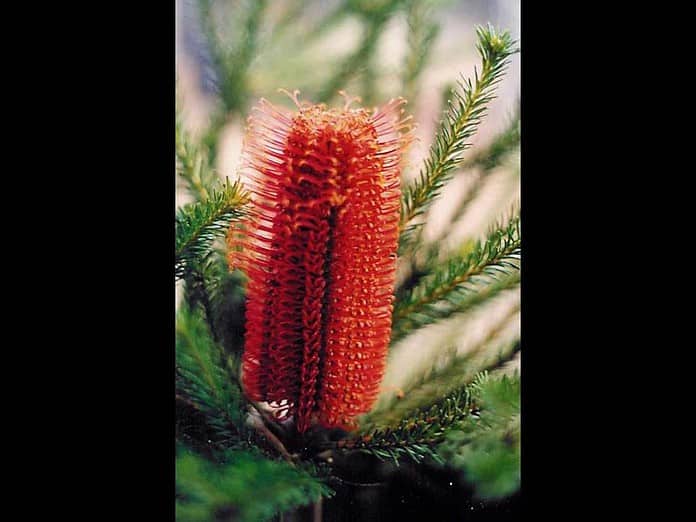
A Fire-Resistant Beauty: Meet the Banksia ‘Red Rover’
The world of plants is vast and diverse, filled with countless species showcasing unique adaptations and stunning beauty. Among these is the "Banksia ‘Red Rover’," a captivating member of the Proteaceae family that stands apart with its fiery blooms and resilience.
A Family Legacy of Adaptation
Banksias are iconic Australian plants, known for their striking cone-shaped flower heads and tough, leathery foliage. They belong to the Proteaceae family, a group of ancient and resilient plants that have evolved to thrive in harsh conditions. This family is famous for its fire-hardy species, many of which are adapted to regenerate after wildfires.
The ‘Red Rover’s’ Striking Features
The Banksia ‘Red Rover’ is a cultivar of the species Banksia ericifolia, also known as the heath-leaved banksia. This hybrid boasts a compact, shrubby habit reaching heights of 3-4 meters, making it suitable for even smaller gardens. Its most distinctive feature, however, is its breathtaking flower spike. From late winter to spring, ‘Red Rover’ erupts in vibrant red-orange flower spikes, each comprising hundreds of tiny individual flowers. These spikes can reach up to 30cm in length, dominating the plant and attracting a wide array of pollinators, including native birds and insects.
Beyond its floral display, the ‘Red Rover’ possesses attractive, silvery-grey, needle-like foliage. This foliage is dense and evergreen, providing year-round textural interest and creating a beautifully contrasting backdrop for the vibrant flower spikes.
A Low-Maintenance, Drought-Tolerant Gem
The ‘Red Rover’ is a low-maintenance plant, particularly suited for dry, sunny spots in the garden. It prefers well-drained soil and is remarkably drought-tolerant once established, making it an excellent choice for water-wise landscaping. The plant’s natural fire resistance is a significant advantage, as it can regrow from its woody base even after a fire.
More Than Just a Pretty Plant
Beyond its aesthetic appeal, the ‘Red Rover’ plays an important role in the ecosystem. Its flowers provide nectar for native birds, while the seed pods are a food source for a variety of wildlife, including the endangered black cockatoo.
Cultivating Your ‘Red Rover’
To successfully cultivate the ‘Red Rover,’ consider the following:
- Location: Opt for a well-drained, sunny spot in your garden.
- Planting: Plant in a slightly acidic soil, incorporating a generous amount of organic matter.
- Watering: Water regularly for the first few years to establish a strong root system. Once established, the ‘Red Rover’ can tolerate drought.
- Pruning: Pruning can be done after flowering to encourage a bushier habit.
Conclusion
With its brilliant blooms, resilience, and low-maintenance nature, the Banksia ‘Red Rover’ is a wonderful addition to any garden. It offers striking beauty and ecological value, making it a true champion of the Australian landscape.
So, why not add a splash of fire to your garden with this captivating, low-maintenance beauty? The ‘Red Rover’ is sure to bring a touch of Australian charm and a vibrant splash of color to your space.



